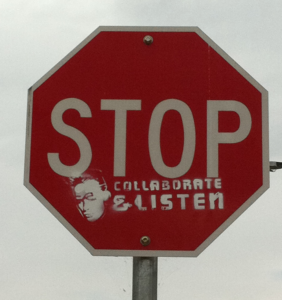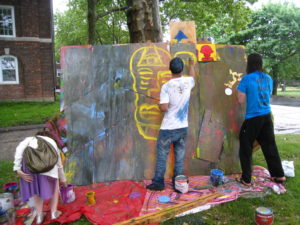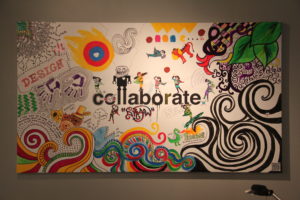Copyright and Conflict in Collaborative Projects
One of the great things about making art is the opportunity to collaborate with other creators. You get to borrow each other’s brains, see stories through one another’s eyes, and create things together that neither of you could have created on your own.
There’s just one little thing: it can be really hard to collaborate with other people.
Other people live outside of your brain, have different opinions, work in different ways and at different hours, have different priorities, and are influenced by different things.
Other People are not You.
And if you want to be able to work well with Other People, you need to accept that, and figure out how to balance your needs, wants, and desires with theirs.
Good collaborations require good negotiation skills, and not just when it comes to plot points and character designs. You also need to be able to talk about the less fun stuff, like splitting money and intellectual property rights.
Talk Early & Often
When you’re really excited about working with someone, talking about copyrights and contracts is not nearly as fun as diving into the work. And for that reason a lot of creators avoid conversations about legal issues for as long as possible.
The sky won’t fall if you don’t talk about who will own the copyright before you start working, but if you each have different expectations about how the rights will work, and you don’t talk about them, it will be much, much more difficult to negotiate an agreement you both feel good about later on.
Talking with your collaborator early on about the legal side of things will avoid misunderstandings and frustrations down the road. So force yourselves to sit down and talk about what you both (or all) want to be able to get out of the project.
Focus first on each other’s whys:
Why do each of you want to work on the project?
Why do you each think this will be a good project for you creatively and for your career?
Why do you want to work with one another?
As you negotiate over rights and money, remember these whys and come back to them if you are finding it difficult to agree on certain terms.
No one wants a copyright because they want a copyright. People want copyrights because of the control it gives them over their work, the security it provides if the project is monetarily successful, and the freedom it gives them to create other things.
People want things because of their whys. Understanding the reason why your collaborator wants to work on this project with you, and articulating your reasons to them, will make discussions over money and rights easier and more productive.
Talk About The Tough Stuff
Once you’ve shared your reasons for wanting to work on the project and with one another, it’s time to talk about things like rights, money, and work responsibilities.
Avoid the temptation to discuss this entirely over email; face-to-face conversation, in person or online, will help avoid misunderstandings and speed things along. If that’s not an option, agree to ground rules for the email discussion, like, “If I’m confused about something you wrote, I’ll check in with you before I assume you’re trying to take advantage of me and steal my first-born child.”
If you discuss nothing else, make sure you hit the following high points. Chances are as you work your way through these questions you’ll discover other things that are important and will help make the collaboration go more smoothly.
- What is your greatest hope for the project? If it happened, describe the things you’d want to be able to do with it and what you’d expect regarding compensation.
- What’s the worst case scenario? If that happened, describe the things you’d want to be able to do with the work and what you’d expect regarding compensation.
- If there are expenses along the way (fees for other artists, advertising), how do you want to split those costs?
- Will one of you manage the business of the work (publishing agreements, royalty payments, etc.), will you both take responsibility, or will you hire someone to do it for you? If you’ll both take responsibility, who will be in charge of what?
- What can you do with the work without the other person’s permission?
- What activities will require sign off from both of you? What will you do if you can’t agree?
- What happens if one of you leaves the project before it’s over? Can the other person continue with it? If so, will the person who left still be entitled to the same compensation?
Collaboration Agreements, contracts that spell out each party’s rights and responsibilities, can be a good way of capturing how you want to deal with all of these issues. That way, if there’s a disagreement later on you can go back to the agreement and figure out what you were both thinking when you were bright-eyed and bushy tailed.
Copyright & Collaborations
It’s important to know that copyright works a bit differently when it comes to joint projects. Unless you decide otherwise (and capture it in writing!), the law will assume you both (or all) own the copyright to the finished product. That means that you don’t own your contribution and they own theirs, but that you both own the result of having your contributions combined into a single piece. If that’s not what you want, a collaboration agreement is necessary to spell out what you each own.
Joint projects also have these defaults when it comes to copyright:
- You can each use the work however you want and sign all the non-exclusive licenses for it that you want without having to ask your collaborator’s permission.
- You both (or all) need to agree to license the work exclusively–like in a publishing or option agreement.
- You’ll split all funds you make from the project equally. This can be an issue if one of you is fronting the money for the project to get made; keep clear records!
- The copyright will last the life of the longest living creator plus an additional 70 years, at which point your heirs will be responsible for managing the copyright. It’s important that everyone’s rights and responsibilities are clear so when you aren’t around your creation will be used and managed the way you want it to.
Of course if you don’t want these defaults, or if you want them but want to flesh them out a bit, a collaboration agreement will help. You can detail how you’ll each own and manage the copyright, which can be a huge help if (when) conflicts arise later on.
Talking about these things can feel intimidating, so give yourself a break. You don’t have to figure everything out in one go. You just have to respect yourself, your collaborators, and the work enough to be willing to talk about these things. And once you’ve talked about them, it will be much, much easier to put together a collaboration agreement that protects your rights, your relationship, and your work.
What are your experiences with collaborative projects? Where there conflicts you think a collaboration agreement may have helped you sort out?
A version of this post originally appeared in Island, Issue #3, from Image Comics.
Categories: Dealing with People







[…] at law and best friend of the artistic community) has this day included on her blog a post about collaboration and how to handle the potentially tricky issues of copyright/ownership. It’s never fun to think that your great artistic partnership could end in acrimony, but […]
Thank you for bringing this out now.
Nintendo shut down a fan-based competitive game, using Nintendo’s images, characters and basic story. The reporter claimed that the off-site game wasn’t hurting Nintendo. It went so far as to claim it was helping the bigger company re-start a group of characters that Nintendo had essentially stopped using.
I wish everyone who created anything would study even a little bit of copyright and trademark laws.
[…] Copyright and Conflict in Collaborative Projects […]